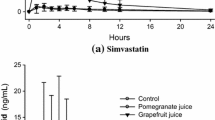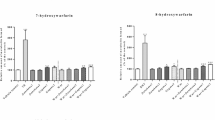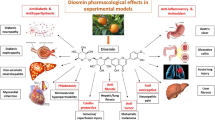Abstract
Objective
Grapefruit seed extract (GSE) is promoted as a natural product with antibacterial and antiviral properties. The aim of this study was to investigate the composition of some commercially available GSE products and evaluate their effect in vitro on two cytochrome P450 enzymes, CYP2C9 and CYP3A4.
Methods
A couple on lifelong treatment with warfarin and continuous regular follow-ups took some drops of a GSE product for 3 days. The female patient experienced a minor subcutaneous haematoma 3 days later, and her international normalised ratio (INR) value was 7.9. This was reported to the Swedish Medical Products Agency (MPA) as a spontaneous post-marketing report concerning adverse drug reactions/interactions. The composition of the GSE products was determined by proton and carbon-13 nuclear magnetic resonance spectroscopy (NMR). The inhibitory effect of the GSE products on the cytochrome P450 enzymes was tested in an in vitro baculosome assay.
Results
The NMR analysis showed that all three investigated GSE products contained the synthetic preservative benzethonium chloride (BTC) in addition to glycerol and water. No authentic GSE extract was found in any of the three GSE products analysed. Furthermore, BTC was found to be a potent inhibitor of CYP3A4 and CYP2C9 activity in vitro.
Conclusion
Our results suggest that BTC in the GSE products is responsible for the increase in the INR value in a patient on warfarin treatment.



Similar content being viewed by others
References
Coates KM, Flood P (2001) Ketamine and its preservative, benzethonium chloride, both inhibit human recombinant α7 and α4β2 neuronal nicotinic acetylcholine receptors in Xenopus oocytes. Br J Pharmacol 134:871–879
Cvetnic Z, Vladimir-Knezevic S (2004) Antimicrobial activity of grapefruit seed and pulp ethanolic extracts. Acta Pharm 54:243–250
da Silva MEF, Meirelles NC (2004) Interaction of non-ionic surfactants with hepatic CYP in Prochilodus scrofa. Toxicol in Vitro 18:859–867
Greenblatt DJ, von Moltke LL (2005) Interaction of warfarin with drugs, natural substances, and foods. J Clin Pharmacol 45:127–132
Halpert JR (1995) Structural basis of selective cytochrome P450 inhibition. Annu Rev Pharmacol Toxicol 35:29–53
Heggers JP, Cottingham J, Gusman J, Reagor L, McCoy L, Carino E, Cox R, Zhao JG (2002) The effectiveness of processed grapefruit-seed extract as an antibacterial agent. II. Mechanism of action and in vitro toxicity. J Altern Complement Med 8(3):333–340
Kaminsky LS, Zhang Z-Y (1997) Human P450 metabolism of warfarin. Pharmacol Ther 73:67–74
Motulsky H, Christopoulos A (2003) Fitting models to biological data using linear and nonlinear regression. A practical guide to curve fitting. GraphPad Software, San Diego
Reagor L, Gusman J, McCoy L, Carino E, Heggers JP (2002) The effectiveness of processed grapefruit-seed extract as an antibacterial agent. I. An in vitro agar assay. J Altern Complement Med 8(3):325–332
Sakamoto S, Sato K, Maitani T, Yamada T (1996) Analysis of components in natural food additive ”grapefruit seed extract” by HPLC and LC/MS. Bull Natl Inst Health Sci 114:38–42
Takeoka G, Dao L, Wong RY, Lundin R, Mahoney N (2001) Identification of benzethonium chloride in commercial grapefruit seed extracts. J Agric Food Chem 49(7):3316–3320
von Woedtke T, Schlüter B, Pflegel P, Lindequist U, Jülich WD (1999) Aspects of the antimicrobial efficacy of grapefruit seed extract and its relation to preservative substances contained. Pharmazie 54(6):452–456
Zhou S, Gao Y, Jiang W, Huang M, Xu A, Paxton JW (2003) Interactions of herbs with cytochrome P450. Drug Metab Rev 35(1):35–98
Zou L, Harkey MR, Henderson GL (2002) Effects of herbal components on cDNA-expressed cytochrome P450 enzyme catalytic activity. Life Sci 71:1579–1589
Author information
Authors and Affiliations
Corresponding author
Rights and permissions
About this article
Cite this article
Brandin, H., Myrberg, O., Rundlöf, T. et al. Adverse effects by artificial grapefruit seed extract products in patients on warfarin therapy. Eur J Clin Pharmacol 63, 565–570 (2007). https://doi.org/10.1007/s00228-007-0289-1
Received:
Accepted:
Published:
Issue Date:
DOI: https://doi.org/10.1007/s00228-007-0289-1




